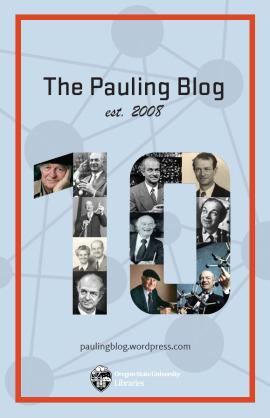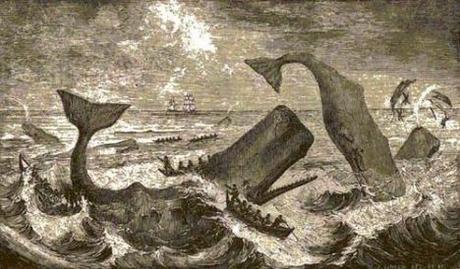
[Extracts from an interview by Tiah Edmunson-Morton with Chris Petersen, conducted on the occasion of the Pauling Blog’s tenth anniversary. This transcript has been lightly edited for clarity. Part 3 of 4.]
Tiah Edmunson-Morton: How many students have worked on the blog?
Chris Petersen: Well, thirty-three people have written for the blog and I would say that probably more than twenty-five of them have been students. It’s mostly students.
So the people that have written for it have been students and me and a sort of random collection of other people. [Pauling biographer] Tom Hager contributed a couple of things he actually had written for something else, but we re-posted them. We also had a guy named John Leavitt, who was an employee of the Linus Pauling Institute of Science and Medicine when it was in the Bay Area, who has taken an active interest in us for a long time. And he’s been our – I called him our East Coast Bureau Chief for a while because he’s based in Connecticut. He’s sent us quite a bit of stuff and we’ve published him.
Another hat that I wear within the department is Remote Reference Coordinator, and so sometimes somebody will contact us with a fairly in-depth inquiry about Pauling and it’s going to be published in a book or in a paper or whatever. And I’ll invite them to write something for the blog and tell them that it actually has a pretty good audience and it’s going to expose your project to a wider audience than maybe it would otherwise receive. And we’ve gotten guest posts based on that as well.
But those are few and far between, relatively speaking. It’s been mostly students, and a full gamut of students too – undergraduates, master’s-seeking, and Ph.D. students. We’ve had good luck with the [Oregon State University] Honors College; we’ve recruited a lot out of the Honors College here. We’ve had good luck with the History of Science program, we’ve had good luck with the English program. But not necessarily just those three – again, there’s a bit of word of mouth from time to time, and just good luck as well happens from time to time too.

TEM: What is the most memorable thing that a student found or researched or asked you about?
CP: Yeah, that’s an easy answer for me. I don’t know what the year was, it’s been a few years ago, but there’s a controversy – a very weird scientific controversy – on something called quasicrystals. Quasicrystals, I would not pretend to be an expert on them, but I can say that they are exotic and they are related to structural chemstry and there’s a lot of math involved.
And so I knew that Pauling had done a lot of writing and speaking about quasicrystals in the ’80s, and he got into basically a dispute with another guy named Dan Shechtman about – I think Shechtman was pro-quasicrystals and Pauling was anti, I’m honestly not even sure at this point. But there was a dispute and Shechtman was right and, as it turned out, Shechtman won the Nobel Prize in 2011 for this work on quasicrystals. And this stands as a piece of evidence about Pauling’s stubbornness and about his inflexibility at times, which was very much a part of his personality, especially as he got older.
I wanted to do something with this, but I knew that I didn’t have the ability to do it and I didn’t figure many students would either. But we finally had somebody who came across my desk who I thought, “she might be able to pull this off.” And she did.
So she devoted a lot of time to this. She was married and her husband created animated gifs to use as illustrations because she felt like that was necessary to provide context for what she was writing. And she worked from home for a while because I think she was having some health issues, and she finally emailed it to me. And she emailed it as a full package and in the email she quoted Moby Dick. And part of the quote – I don’t know the whole thing – but “from hell’s heart I stabbeth thee” was part of what she said because she had slayed this white whale of this set of posts about quasicrystals.
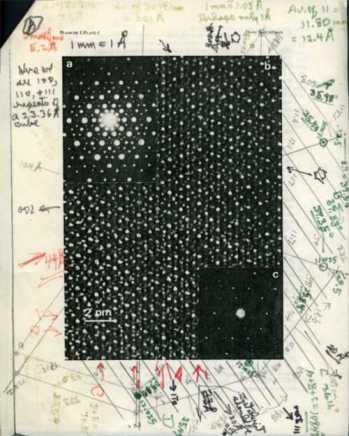
And it was terrific, it really was. She was an extraordinary talent. And that was, I think, pretty much the end of her time with us; I don’t know what happened to her since, I hope that she’s done well. But she was exceptional and that really stands out in memory as just being a terrific accomplishment; something that I couldn’t have done. I think that most of what we publish is good to pretty good to excellent, and most of it I could do if I had the time and wherewithal. But I don’t know if I could have done that. She did and it was great. So, “from hell’s heart I stabbeth thee.” [laughs]
TEM: I was sort of thinking that the answer to that would not be quasicrystals but that it would be something more controversial. So Pauling also had other controversial aspects of his life and his career and I’m curious about how you’ve dealt with that?
CP: Yeah. I think that the blog is mostly friendly to Pauling and I think that’s valid. We are not an exercise in hagiography though, and we have written things that are not necessarily flattering. I think the quasicrystals instance is one of them, in fact.
The topic du jour these days is whether or not Pauling was a eugenicist, and we’ve written on that. It’s tricky, for sure, but I think we’ve taken a pretty balanced approach to that. And the last bit that we did was actually a summary of a talk that was given here by somebody from our Resident Scholar Program. So that’s been another thing that we’ve done is writing profiles on the different people who have come here as Resident Scholars to do work on Pauling; there have been several of them. And this guy gave a nice talk that, I think, presented the nuance pretty well, and I wrote that post. I was there for his presentation, I re-watched it, I wrote up the notes, and I thought a lot about how to present this. And I think that stands as a nice statement on Pauling’s point of view related to eugenics, which I’m not going to get into here. But that is one instance.
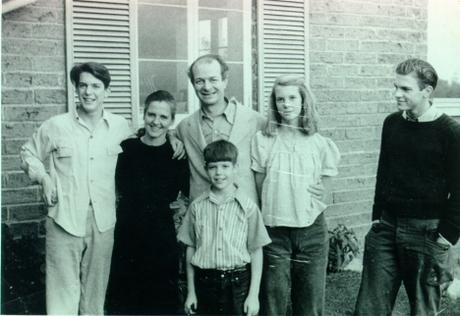
Another instance that I think is valid is his relationship with his children. We’ve done two sets of posts on his two sons that are no longer living – Crellin was the youngest one and was actually the first one to die, and then Peter was the second oldest of the kids who had a tough life on a lot of levels. And we took a deep dive on both of them and engaged with their life stories in a way that, I’m sure, nobody else has.
Pauling, I think, he was of a different generation of parent than I am. He was very focused on his career and he had a wife who saw it as her role – early on, at least – to care for the children and to create a scenario in which he could do his work most effectively.
And he did a lot of very effective work, but I think it also had an impact on his kids on some level. I think that he loved them, I think that he certainly provided for them well after they were out of the home – most of them. But that warmth was not always necessarily there and the time was not there for sure, and that’s a criticism. And I think that comes through in the writing on some level.
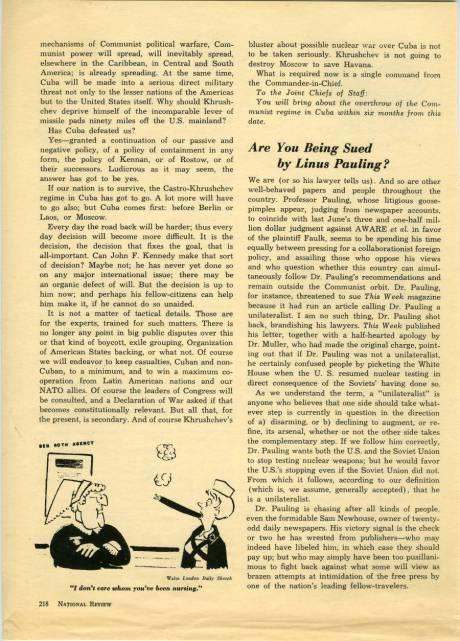
So those are a couple bits. Another thing we’ve done is written extensively about lawsuits. And he was involved in a lot of lawsuits. The ones that we’ve engaged with are well in the past and they’re libel lawsuits – mostly papers or magazines calling him a communist, and him being very litigious about it. And, so there was a Supreme Court verdict that came through that basically shot his point of view down and that was the end of him being successful with these lawsuits, but he pursued them doggedly and a sort of persnickety side of his personality arises.
He could be a little cranky at times and he probably had a right to be as far as that was concerned, but in my reading of the documents and just in his interactions with people as a writer of letters, he was always very formal and he sometimes could be pretty terse and not especially warm. So we dug into the lawsuits in significant depth and I think that showed pieces of his personality as far as that’s concerned.
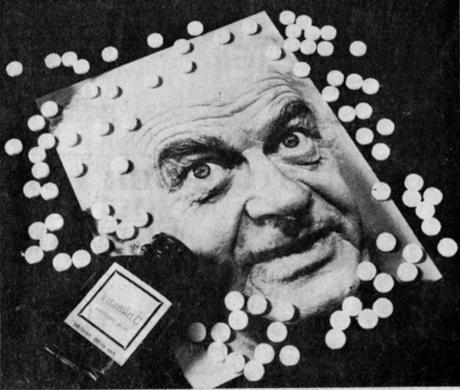
We’ve done a lot of work on vitamin C, especially vitamin C and cancer, and to a lesser degree vitamin C and the common cold, and vitamin C and heart disease. And Pauling was obsessed with vitamin C – I think that’s a fair statement – and was not necessarily willing to hear contradictory points of view very much, or perhaps pursued lines of inquiry that were not super scientific but were favorable to his perspective or were overly favorable.
And so some of that has emerged in the writing. But I also think, there seems to be a trend now – a rising trend – of scientists who are starting to think that he was on to something, and that’s been fun to document as well. So the idea basically is that if you take vitamin C orally you are not able to absorb most of it, you excrete most of it in your urine. So there’s a threshold of absorption. And he knew that, I think, but tried to suggest different ways of taking it, kind of a steady dose over the course of an entire day that would increase the concentration in the blood. But some of the things that he said were going to happen concerning the promise of vitamin C to heal in various ways were lost because you just couldn’t absorb the ascorbic acid into your body.
But in more recent time, scientists seem to be coming to the understanding that if you take it intravenously it’s a different transport mechanism and you’re able to absorb a lot more and, in fact, some of what he thought was going to happen may actually be true. And this is of, like, last Fall – there was a seminar at the Linus Pauling Institute for their Diet and Optimum Health Conference that was devoted entirely to that. So I sent one of our students to cover it and it was great. It’s really fun for me to be able to follow that a little bit and to convey that a little bit, because he took a real beating for his point of view on that. And his tactics were not the best tactics, but it’s pretty interesting to me that, these many years later, he actually may have been right about some of that stuff.
